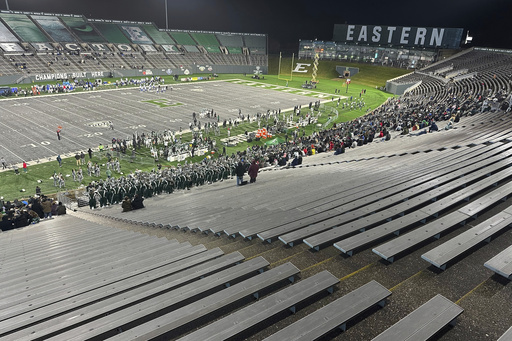
YPSILANTI, Mich. — On a chilly Wednesday evening, with temperatures plunging into the 30s, a small contingent of fans clad in warm attire gathered to witness Buffalo defeat Eastern Michigan 37-30 on gray turf. While the game itself may not have been remarkable, it was one of the notable weeknight matchups that the Mid-American Conference (MAC) has made a staple of its schedule.
MAC Commissioner Jon Steinbrecher discussed the impact of midweek games in a recent phone interview. He noted that many fans mistakenly believe all MAC games occur on Tuesdays and Wednesdays, whereas only some are played at that time in November. This scheduling strategy has allowed the conference to garner national attention, transforming it from a regional league into one with a prominent national identity.
Viewership for MAC football games on ESPN or ESPN2 during the past two seasons showed a remarkable difference, with audiences surpassing by tenfold compared to Saturday matchups that often compete with a crowded lineup of other options. The most viewed MAC game in the last two years occurred earlier this month on a Wednesday night, attracting 441,600 viewers when Northern Illinois faced off against Western Michigan, not accounting for streaming numbers excluded by Nielsen ratings.
In contrast, the highest linear TV audience for a MAC game played on a Saturday during the same timeframe recorded only 46,100 viewers. “Having the whole nation watching on Tuesday and Wednesday night is a huge deal for the MAC,” said Eastern Michigan tight end Jere Getzinger. “Everybody wants to watch football, so if you put it on TV during the week, fans will tune in.”
Since the early 2000s, ESPN has been featuring midweek MAC football games, recently extending their partnership for another 13 years, which will last at least through the 2026-27 season. This collaboration has allowed the MAC to effectively leverage its midweek slots, coining the term MACtion on social media—a catchy branding effort tailored for the Group of Five football programs that often operate under the radar across Michigan, Ohio, Indiana, Illinois, and New York.
However, weeknight games typically see a dip in attendance, as students may be hindered by classes or homework, and adults might stay home due to early work commitments the following day. Buffalo coach Pete Lembo acknowledged this trade-off, emphasizing the significant national exposure that accompanies these games. As he pointed out, on many November weeknights, average fans are likely to settle in on the couch for a game with snacks in hand.
In a recent Tuesday night game against Ball State, where Buffalo triumphed 51-48 in overtime, the reported attendance was 12,708, a number that seemed optimistic given the number of empty seats visible after halftime. “You watch the games on TV, and the stadiums all look similar,” Buffalo fan Jeff Wojcicki remarked. “They might not be full, but it’s the only game to watch, so you know where to find it.”
The scheduling can also disrupt sleep and practice routines, forcing students to manage their class commitments amidst the altered game preparations. Eastern Michigan center Broderick Roman recounted a long bus ride home from a game against Ohio, returning at 3:30 a.m. and then facing early classes the following day; a challenge he acknowledged as part of the athlete’s commitment.
Throughout November, this unique conference schedule is evident, as the MAC featured ten games exclusively on Tuesdays and Wednesdays during the first two weeks of the month. The most recent week included five such games, while only a single matchup remained on the traditional Saturday calendar, where Ball State was set to host Bowling Green.
Looking ahead, Toledo will face Akron and Kent State will visit Buffalo next Tuesday, with additional games scheduled for the following Friday and Saturday, ultimately determining the teams that will compete for the conference title on December 7 in Detroit. Overall, MAC teams will likely play around 75% of their games on Saturdays, with the remainder in November on weeknights.
As the Eagles concluded their practice prior to facing off against Buffalo, tight end Jere Getzinger shed light on the peculiarities of the scheduling. “It’s Monday, but it feels like a Thursday for us,” he quipped. Bowling Green coach Scot Loeffler expressed that November’s schedule twist often leaves him disoriented regarding the day of the week. “The whole week turns upside down,” he said. “It’s chaotic, but it’s fantastic for the league because it ensures there are two nights each week during this period when fans around the nation can watch MAC games.”
